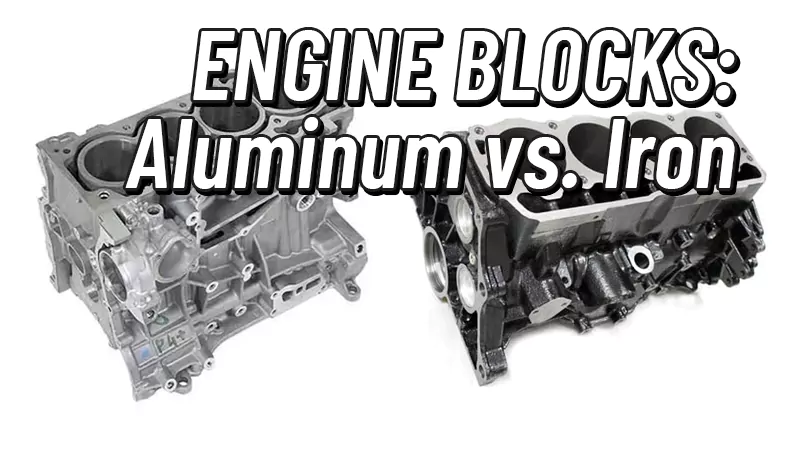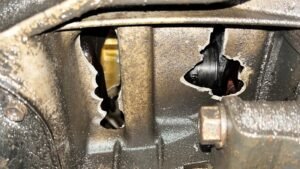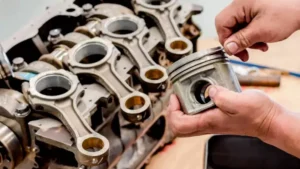The engine block is the backbone of every internal combustion engine, functioning like the skeleton of a human body. Without it, an engine cannot operate, as all major components—cylinders, crankshaft, oil pan, and even the transmission—attach directly to it. Therefore, the material and design of the engine block critically affect strength, durability, performance, and reliability.

Iron Engine Blocks
Iron engine blocks have been used since the early days of internal combustion engines due to their low cost and manufacturing simplicity. In the 1960s and 1970s, aluminum blocks began appearing in mass-produced passenger cars but accounted for less than 1% of newly produced engines at the time. Iron blocks remained dominant in commercial diesel engines, stationary engines, and enthusiast markets.
Iron blocks are typically made from Grade Cast Iron (GCI), most commonly Class 20 or Class 25, with tensile strength ranging from 20,000 to 25,000 PSI. Advanced applications sometimes use Compacted Graphite Iron (CGI), which provides 1.5 to 2 times the tensile strength of standard cast iron, mainly for high-pressure diesel engines in trucks and agricultural machinery, and rarely for passenger vehicles.
Aluminum Engine Blocks
Aluminum blocks are valued for their lightweight properties, which improve fuel efficiency, acceleration, and overall vehicle performance. Early aluminum casting often suffered from oxide layer formation, reducing structural integrity. Modern aluminum casting, including T5/T6 heat treatment, squeeze casting, sand casting core packages, and vacuum feeding techniques, significantly enhances strength and reliability.
Common OEM aluminum alloys include 319, A356, and A357, which, after heat treatment, reach tensile strengths of 10,000–14,000 PSI. High-strength aluminum alloy 6061 is reserved for billet blocks in extreme motorsport applications and is almost never used in OEM production.
Casting Considerations
Both iron and aluminum engine blocks are produced via casting. Iron is relatively insensitive to casting conditions, whereas aluminum’s tendency to form oxide layers in liquid form requires precise process control. Advanced casting technologies have significantly improved aluminum block quality, but cost remains higher—typically three to four times that of iron depending on the alloy. Lower-end aluminum engine blocks may still use simpler casting methods, resulting in weaker structures.
Weight and Strength
Aluminum is more than twice as light as iron, but due to its lower tensile strength, aluminum blocks require thicker walls and reinforcement structures, such as main bearing ladder frames, especially in high-performance engines. Iron blocks, on the other hand, are inherently strong and stiff, allowing simpler casting without such reinforcements.
Average weights of aluminum vs iron engine blocks in inline-four, V6, and V8 engines demonstrate that aluminum is lighter, though not exactly half the weight of iron. Despite this, the weight savings—typically 1.5–2% of total vehicle weight—contribute to improved fuel efficiency and acceleration over time.
Wear Resistance
Iron provides superior wear resistance. Most aluminum blocks use cylinder liners, often made of iron, to improve durability. Linerless aluminum blocks exist with coatings such as Nikasil, Alisil, or MMC, but these can limit rebuild options and, in some cases, may be difficult to repair.
Repair and Rebuilding
Aluminum blocks are easier to repair for cracks using TIG welding, while iron blocks require specialized furnace welding and skill. Iron blocks are simpler to rebuild and more tolerant of overboring, making them ideal for enthusiasts seeking cost-effective, boosted performance. Linerless aluminum blocks are often replaced rather than rebuilt due to coating limitations and cost.
Conclusion
Both iron and aluminum blocks have advantages. Iron offers strength, wear resistance, and rebuildability, making it ideal for heavy-duty and performance tuning applications. Aluminum offers reduced weight, better heat transfer, and higher potential compression ratios, making it ideal for fuel efficiency and modern OEM engines.
If you are looking for high-quality engine blocks and cylinder heads, XINJIN specializes in manufacturing complete engine assemblies with both iron and aluminum options. Contact us today to discuss custom solutions for your engines and production needs.



